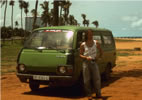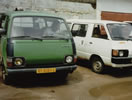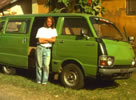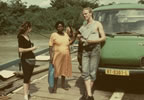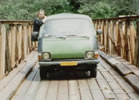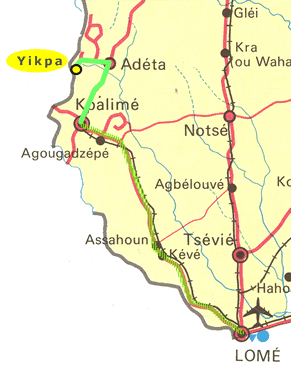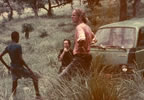Taxi Chauffeur
 After hanging out in Togo for a few months, it occurred to me that I was going to have to find a way to make some money. So I maxed out my credit card and bought a 9-year-old Toyota Hiace minivan from a French guy in the port of Lomé. I became a
member of the state-run drivers union, and started working as a bush taxi operator between Yikpa and Kpalimé.
After hanging out in Togo for a few months, it occurred to me that I was going to have to find a way to make some money. So I maxed out my credit card and bought a 9-year-old Toyota Hiace minivan from a French guy in the port of Lomé. I became a
member of the state-run drivers union, and started working as a bush taxi operator between Yikpa and Kpalimé.
The road to Yikpa
The fresh-baked taxi entrepreneur
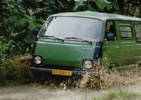 All over Africa, bushtaxis are the way to move people around. Only in North Africa I saw large busses play a major role in public transport. All over Sub-saharan Africa, however, bushtaxis do most of the people-hauling. And from what I've heard, bushtaxis are also very common in Central- and South America and in Asia.
All over Africa, bushtaxis are the way to move people around. Only in North Africa I saw large busses play a major role in public transport. All over Sub-saharan Africa, however, bushtaxis do most of the people-hauling. And from what I've heard, bushtaxis are also very common in Central- and South America and in Asia.
Most of the taxis in Togo are operated by companies that own dozens of vehicles. The drivers are paid salaries and a commission. However, owner-driver operations are also very common, especially on the rural routes. Almost all of my colleagues on my main routes owned their vehicles. Only a few drove other people's cars. And those were still small operations with no more than three cars, where the owner also worked as a driver himself.
At the taxi station
Life as a bush taxi driver is not that bad. Ok, it 's hard work, with long hours, and you have to put up with the customers. But if the economy is good and people travel, you make decent money. As a taxi-chauffeur you also get to see the country and for me it was a great way to explore the country and become part of the community. In turn, I provided the community with an essential service. My van was the only vehicle in our valley after dark, and it was a big deal to have a taxi based in the village. On several occasions, I drove people to the hospital in the middle of the night. I also did a bit of chauffeuring for the chief, who was very pleased about this service :)
Back in the village after buying my Toyota
Crossing the Volta river in Ghana on a trip with friends
Getting started was a bit tricky. I had to convince the union USINDICTO to let me join. I had to go all the way to the secretary general to get a membership. We met in Lomé, and he was actually very nice, once I explained that I really just needed a job. We sat down over a cup of tea (he was a Muslim Cotocoli from northern Togo) and we chatted. He interviewed me thoroughly about my intentions and motivations. I think it was partly just curiosity, and partly he was in fact checking me out.
Convincing the Togolese colleagues that I was for real, that this white guy actually had to work, was not easy. To many Togolese white people all grow their money on trees and don't have to work. Consider that most white people they run into are either tourists, who may well spend a month or two cruising around (if they are European), or well-paid development workers (and even Peace Corps volunteers count in that category). This makes it seem to many Africans that people from Yovoland never work and never run out of money.
Of course there was also an occasional racist or xenophobic remark. The worst problems I had with a station master of the Kpalimé station in Lomé (hôspital). He refused several times to give me departure tickets, which were essential as a permission to pick up passengers. I was told that he made nasty remarks about the "damn foreigner" and used some racist slurs. And all that despite my initial attempts to be friendly by handing out some generous cadeaux (presents). He refused to take it and started a fuss over me trying to bribe him. That was, of course, ridiculous, since he took the cadeaux from my colleagues
One of the scariest bridges in Togo
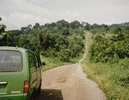 I worked the Yikpa-Kpalimé route daily. Fridays I went to Lomé. Wednesdays, I mostly just did the Adéta marché. I got up before daybreak, at 5:00 AM, got in the van and drove to the taxi stand at the border. You had to be there first, and since I was based less than a mile from the border, I had a big advantage. Later, when my friend Dennis could drive, he often took the van, got the first load, and picked me up on the way out. That way I was better rested for the long day.
I worked the Yikpa-Kpalimé route daily. Fridays I went to Lomé. Wednesdays, I mostly just did the Adéta marché. I got up before daybreak, at 5:00 AM, got in the van and drove to the taxi stand at the border. You had to be there first, and since I was based less than a mile from the border, I had a big advantage. Later, when my friend Dennis could drive, he often took the van, got the first load, and picked me up on the way out. That way I was better rested for the long day.
The trip across the plateau was a killer. The road was in terrible shape, with huge potholes, many hairpin turns, and high vegetation along the side. With a full load, passengers and merchandise, I could not stop for long stretches - the vehicle would not have been able to start. A couple of times, when I had to stop at very steep spots, I had to roll back to a flatter area to get going again.
Somewhere in Ghana
Up on the plateau, the route went through several villages, and people would flag us down to see if we were headed their way. Some wanted to just get to the next village, some wanted to get to Adéta, some to Kpalimé. For the driver, the strategy is, of course, to fill the vehicle with payload for a non-stop trip. Picking up passengers on the way is a pain, especially when you compete with other vehicles to beat them to the next taxi station. So when your turn is up at the taxi station, you had to decide what town you were targeting. At the larger stations, you had to get in line with your vehicle for the various destinations. In Yikpa, we were at a border station, and so everyone wa going in the same direction. Still, depending, on my strategy for the day, I may just load passengers for Kpalimé, and let another driver pick the local destinations. Or I just wait for a while, get a few passengers, and count on picking the road clean. All in all, I could make more than 5000 FCFA on a good day, which was pretty decent money in those days.
It is essential for this job to understand the daily, weekly and seasonal needs in your community. You have to know when the markets are, who goes to which markets. You have to know how to negotiate fares with merchants and you have to know where the other drivers are, and what their strategies are. And yo have to be on your toes, because this is a tough business and everyone does their very best to cheat another driver out of passengers.
One common practice is this: when a larger van is loading and passengers are worried it may take a while, a driver with a smaller car gets a departure ticket and leaves the station, pretending he'll just pick up passengers on the road. He'll drive just out of sight and then send word back for the most impatient passengers to sneak out, and meet him down the road.
I also did many charter trips, for merchants, tourists and for Peace Corps. Those trips went all over Togo, several times to Benin, once to Ghana, and once to Burkina Faso. Although I lived right on the border to Ghana, entering that country was difficult, because I had to get an expensive visa at the embassy in Lomé. Besides a fairly regular schedule of Lomé trips I also had several trips up north, to Sokodé, Kara, and Dapaong.

